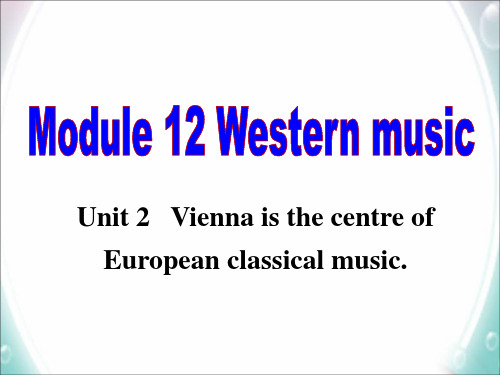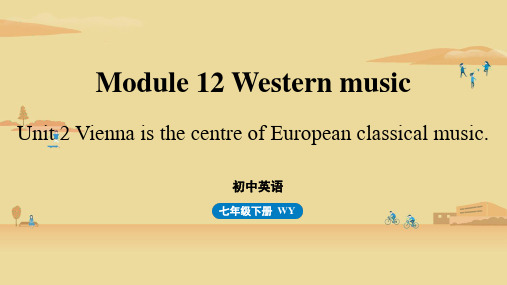2015-2016学年外研版初中英语七年级英语下册Module12Unit2课件(共32张PPT)
外研版七年级英语下册 Module 12 Unit 2课件

Read paragraph 2 and finish the true or false.
3. Mozart’s family took him around
Europe. √
4. The fatherM, Jozhaarntn Strauss, died in
1791. × Johann Strauss the younger
5. Mozart wrote The Blue Danube. ×
不仅…, 而且… not only …, but also… 带某人周游欧洲 take sb. around Europe
举办音乐会 give concert
1. Vienna is a beautiful old city on the River Danube in the centre of Europe. 维也纳是位于欧洲中部多瑙河畔的一座 古老而美丽的城市。
work in Vienna. √
2. SMtroazuasrst tphleayyeodungoetropnlayytehde tphieanpoiabnuot, tahlseovtiholeinviaonlidntbheefodrreuhmeswaat sthseixa. ge of
six. ×
This class we will learn a passage about some famous musicians that cen and answer the questions.
外研版七年级英语下册Module12Unit2课件

experience He studied in Paris
He is famous for the song The Yellow River Xian Xinghai his music He wrote it in 1939
He used traditional Chinese music
die
Unit 2 Vienna is the centre of European classical music.
Do you know these instruments? Can you play them? Do you know any famous musicians? Have a discussion with your partner.1_6__8__7_.
1867
Paragraph 3
1. What did Mozart play before he was six?
A. The violin.
B. The piano.
C. The violin and the piano.
2. What did Mozart do in Europe with his family?
1564 1578
1582
born finish school marry
1592 go to London
1593 join a
theatre Company
1616 die
a famous English writer
job
be born expereince: finished... married, went to... appreciation
2 called 是过去分词,在句中做定语,意为 “叫做” . e.g The boy called Weiming is lovely.
外研版 七年级英语 下册 课件 module12 unit2 Vienna is the centre of European classical music

Warm-up
2015/9/18
Reading: 1.Pre-reading 2.While-reading 3.Post-reading
2015/9/18
Pre-reading
Show some instrument
1.Fast-reading 2.careful-reading
(一).Status
and demands
This is a lesson in Book 2. It’s a reading material about western music. This lesson is very important in this book. The purpose of teaching is to make the students understand western music .
IV .Teaching aids V.Analysis of teaching process. VI. Blackboard designing.
I . Analysis of the teaching material
teaching material
Status and demands Analysis of students’ situation Learning aims Important and difficult points
2015/9/18
(一)Fast--reading.
Match the headings with each paragraph. Para. 1 a. the Strauss family Para. 2 b. Mozart Para. 3 c. Vienna
外研版七年级英语下册Module12Unit2课件4

Careful reading
Read Para. 2 and answer.
1. What music did Johann Strauss the elder write?
2. How many waltzes did Johann Strauss the younger write?
He wrote music for traditional dances, called the waltz.
in ________ Austria in 1756
not only the piano He played _________ _______ but also the violin.
He wrote _____________ hundreds of wonderful
pieces of music.
To write a passage about Xian Xinghai.
Learning aims
What instrument(乐器) is it?
Erhu
Hulusi
drums
piano
guitar
violin
waltz n.华尔兹舞曲
Waltz is a piece of dance music.
小试身手:
1)The TV play made us___________ to tear. A
A. move B. to move C. moved D. moving 2)I like pop music, it __________________( makes me happy 能使我高兴). 3)She tried to make the baby ________ not cry (不再哭了) any more.
外研版英语七年级下册Module 12 Unit 2《Vienna is the centre of

外研版英语七年级下册Module 12 Unit 2《Vienna is the centre of Europeanclassical music》教学设计一. 教材分析外研版英语七年级下册Module 12 Unit 2的主题是《Vienna is the centre of European classical music》,本节课主要介绍了维也纳作为欧洲古典音乐中心的地位以及相关的音乐家和作品。
教材通过介绍音乐家Mozart, Beethoven和Schubert 的生活和音乐成就,让学生了解维也纳在这方面的独特地位。
课文内容丰富,插图精美,激发了学生学习兴趣。
二. 学情分析七年级的学生已经具备了一定的英语基础,对于日常对话和简单的阅读材料能够进行理解和表达。
但是,对于关于音乐家和作品的专业词汇以及较为复杂的句子结构,学生可能还有一定的困难。
因此,在教学过程中,需要帮助学生掌握相关词汇和句型,提高他们的阅读理解和表达能力。
三. 教学目标1.知识目标:–学生能够掌握关于音乐家和作品的相关词汇。
–学生能够理解课文内容,掌握相关的句型和语法结构。
2.能力目标:–学生能够用英语进行简单的对话,表达自己对于音乐的理解和感受。
–学生能够阅读并理解关于音乐家和作品的英文文章。
3.情感目标:–学生能够了解和欣赏维也纳作为欧洲古典音乐中心的地位,对于音乐文化有更深入的理解。
四. 教学重难点•学生能够掌握关于音乐家和作品的相关词汇。
•学生能够理解课文内容,掌握相关的句型和语法结构。
•学生能够用英语进行关于音乐家和作品的讨论和表达。
•学生能够理解并运用课文中复杂的句子结构和语法知识。
五. 教学方法1.任务型教学法:通过设计各种任务,让学生在实践中学习和运用语言。
2.情境教学法:通过设置音乐相关的情境,让学生在真实的语境中学习和运用语言。
3.互动教学法:通过教师与学生、学生与学生之间的互动,激发学生的学习兴趣,提高他们的参与度。
外研版七下英语 Module 12 Western music Unit 2

another/ə'nʌðə/ det. 又一;再一;另一 [限定词]又一;再一;另一修饰可数名词单数,用于三者或三者以上,具有不确定性。
the poor 穷人 the rich 富人the young 年轻人 the old 老年人
...and many people still think his music is perfect. ……(现在)许多人仍然认为他的音乐是完美的。(教材P74)
perfect/'pɜ:fɪkt/ adj. 完美的 [形容词]副词形式为perfectly"完美地"。 Practice makes perfect. 熟能生巧。There is no perfect job in the world. 世界上没有十全十美的工作。The computer works perfectly now.这台电脑现在运行得好极了。典例3 根据句意和首字母提示写出单词。(天水中考)No one is p______. Everyone makes mistakes.
续表
older
年龄较大的
常用来修饰人,指年龄较大的。
既可作表语也可作定语。
较老的,较旧的
常用来修饰物,指较旧的。
既可作表语也可作定语。
(1)the elder 用于人名前或后,表示同名的两个人中年龄较大的一个。the elder Peter=Peter the elder 老彼得(2)elders[名词]长辈;长者Children should respect their elders. 孩子们应该尊重他们的长辈。(3)elderly[形容词]年老的the elderly 老人;上了年纪的人She does some voluntary work, caring for the elderly. 她干一些照顾老人的志愿工作。
外研版英语七年级下册:Module 12 Unit 2 Vienna is the centre o
Module 12 Western musicUnit 2 Vienna is the centre of Europeanclassical music一、课型Reading and writing二、教学目标1. 语言知识目标:掌握下列单词: musician centre European classical century composer elder waltz dance music another piece poor perfect2. 语言技能目标:1)To understand the description of Vienna and the composers2)To be able to write a passage about a musician or composer3. 情感目标:通过对西方音乐及音乐家的了解,培养热爱生活、热爱音乐、积极乐观的精神。
三、教学重点/难点1. Key vocabulary --- centre another poor perfect2. Key structures --- In the eighteenth century…He played not only…but also …四、教学用具Multimedia五、教学方法Top-down approach六、教学过程Step1:Warming-up and Lead-inFree talk. (Do you know these instruments? Can you play them? Do you know any famous musicians?)(师生讨论音乐的话题,增进课堂互动。
)Step2:Before task.(1)Show some pictures of different musical instruments on the screen.Students answer what they are.Ask and answer: What kind of instrument do you like?I like _________.(2)Show some composers’pictures.Tell students to talk in pairs about their favourite musical instruments and musicians. (e.g. pop singers, rock bands, classical musicians )(3)Read the words together.(musician centre European classical century composer elder waltz dance music another piece poor perfect)Step3:While task.1.Describle the pictures. Use the words from the box to help you(1)Ask students whether they have ever been to a traditional Western music concert. Find out if any of the students sing in a choir or play in an orchestra.(2)Read the words in the box and have students repeat themafter you.(3)Put students in pairs to describe the picture.2.Read the passage and check(✔) the true sentences.(1)Pre-listeningTell students some information about Vienna in Austria. Show them a picture of Vienna.(2)Listeninga. Tell students they are going to listen to a passage about some famous classical musicians that came from Austria.b. Tell students to listen and answer the following questions:1).How many musicians are there in the passage?2).Who was a very young musician?3).When did Mozart start playing the piano?c. Play the recording twice. Students listen and try to answer the questions in pairs.(2)Readinga. Read quickly and match.Para.1 A. the Strauss familyPara.2 B. MozartPara.3 C. Viennab. Ask students to read the statements and check (✔) the true sentences. (Read the passage and underline key information and not to worry about the vocabulary they don‘t know.)1). Many musicians came to study and work in Vienna.( )2). Strauss the younger played the piano, the violin and the drums at the age of six. ( )3). Mozart’s family took him ar ound Europe. ( )4). The father, Johann Strauss, died in 1791. ( )5). Mozart wrote The Blue Danube. ( )c. Read the passage with students and answer thequestions.(Tell them to check in pairs and go back to the passage if their answers are different.)1). Where is Vienna?2). What music did Johann Strauss the elder write?3). How many waltzes did Johann Strauss the younger write?4). When was Mozart born?5). How old was Mozart when he died?d. Complete the passage with the correct form of the words from the box.First. Read the words in the box together.Second. Ask if there are any they don’t understand.Then. Complete the passage individually.Finally. Check their answers in pairs.Step5:Language points1.Before he was …not only the piano, but also theviolin.(not only …but also…)2.But he became very poor and died in 1791 when he was onlythirty-five.(die/dead/death/be dying)3.His dance music made him famous all over Europe. (make sb.do/make sb.+ adj. /all over)Step6: Practice1.用所给词的适当形式填空。
外研版七年级英语下册Module 12 Unit 2 课件
根据P74课文的内容,完成短文填空
Vienna is a beautiful old city on the River Danube.
It's
the
capital
1. __________
city
of
Austria
and
the
2ce. n_tre______
of
European classical music. There were two 3. _c_o_mp_o_se_rs____ called Johann Strauss:
piece n. (写作、音 乐或艺术 的)作品
¤musician 是名词,意为“乐手;音乐家”, music 是名词,意为“音乐”。意义不同。
¤European 是形容词,意为“欧洲的”, 它的名词形式是 Europe,意为“欧洲” 。
¤century 是名词,意为“世纪”,即一百年 century = a / one hundred years
3. Mozart’s family took him around Europe. √
4. The father, Johann Strauss, died in 1791.
5. Mozart wrote The Blue Danube.
Answer the questions. 1. Where is Vienna?
Xian Xinghai is 6. ___o_n_e o_f____ the great composers of classical and traditional music. He was born in Marco, China , 1905. He studied in Paris,th7e .ca_pi_ta_l o_f______ France. Xian Xinghai is 8. _f_am_o_us_f_or____ the song The Yellow River 9. ___all_o_ve_r___ the world. He wrote it in 1939 in only six days. His songs have been popular for more than sixty years. He is called the people's Musician. He died in 1945, 10. _at_th_e_ag_e_o_f ___ forty.
外研版英语七年级下册:Module 12 Unit 2 Vienna is the centre o
1.Divide the passage intosomeparts.
2.Match the main ideas with each partonthelearning sheet.
Step4.
famous, successful, popular, important, great, perfect.
Teaching difficult points
1. To helpstudentsto improve their reading ability.
2.To helpstudentstowrite a passage about describing a person.
1.Read Part 2carefullyand complete the tableonthelearning sheet.
2.Learnhow todescribea person.
3.Retellparagraph 3 about Mozart with the key words and expressions in their groups.
Teachingimportantpoints
1. To help students to learn some new words about Vienna and composers such as musician, composer, European, elder, centre, waltz.
学生能够喜爱音乐,感受音乐能使人愉快,放松,感动,兴奋等。
学生能够理解音乐能使人了解不同文化的差异,能够尊重和认同不同文化。
外研版七年级下册英语Module 12 Unit 2 Vienna is the centre
Module12 Westernmusic
Unit2 ViennaisthecentreofEuropeanclassic
almusic.
词汇串新知 提示:点击 进入习题
课文对对碰
一
二
1 elder
1B
1C
答案呈现
2 composer
2A
2C
3 pieces 4 poor
3C
3C 4C
5 perfect
三 1 on
课文对对碰
6 violin
2 capital
7 poor
3 centre
4 played
5 born
答案呈现
1 century 2 perfect 3 musician 4 poor 5 classical
轻松夯基础
6 musician 7 European 8 hundreds 9 elder 10 pieces
8. Lastyear, thestudentsplanted_____h_u_n_d__re_d(shundred) oftreesonthemountain.
9. Her_____el_d_e_r___ (old) sisterisafamoussinger.
10. Whenshewasyoungshewasabletoplaymany_______p_ieces (piece) ofmusicbyMozart.
D. Thedrums.
4. WhendidJohannStrausstheyoungerwriteTheBlueDanube?
A. In1791. C
B.
In1756.
C. In1867.
